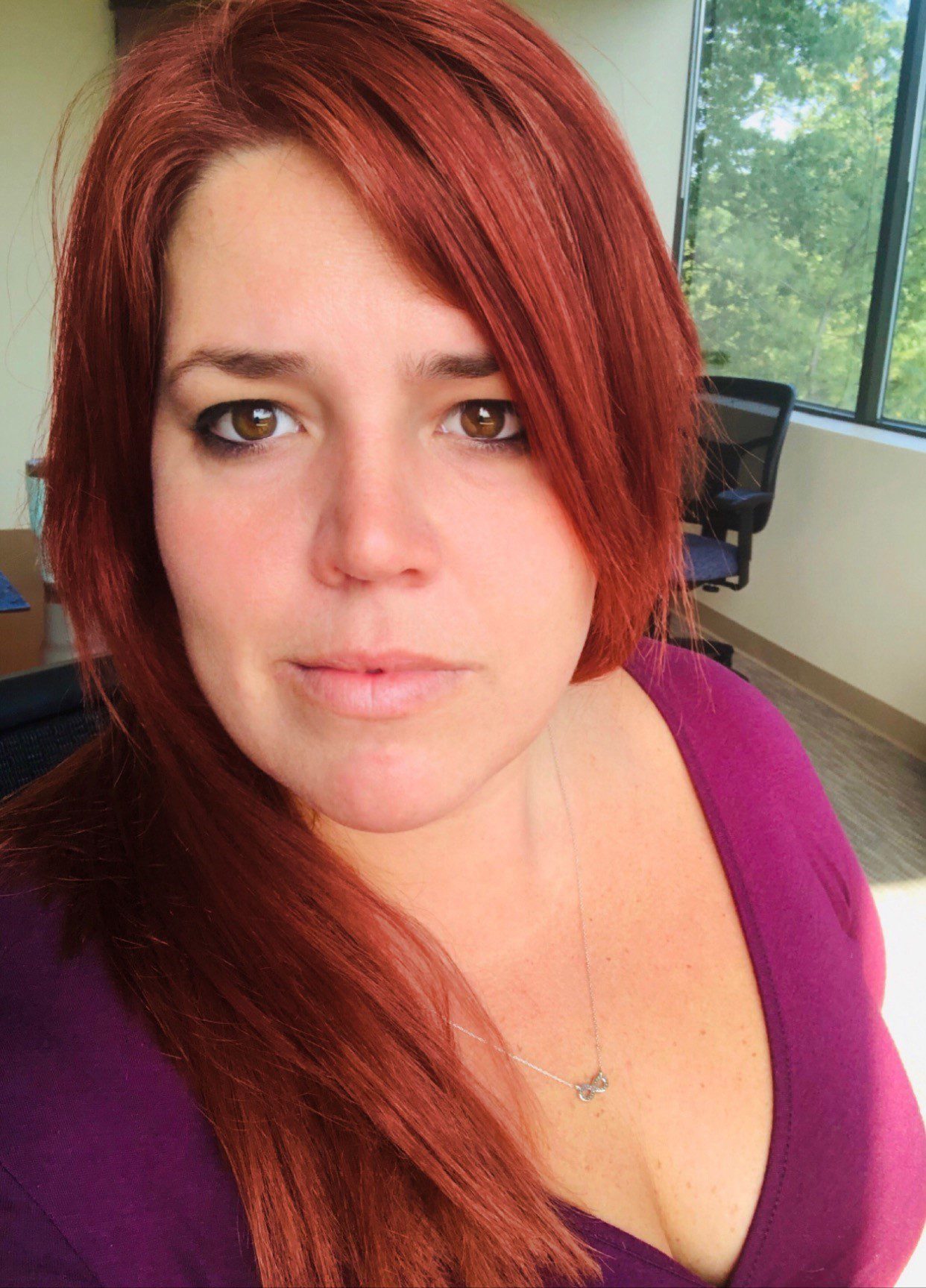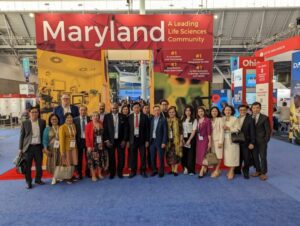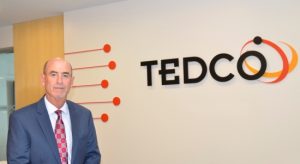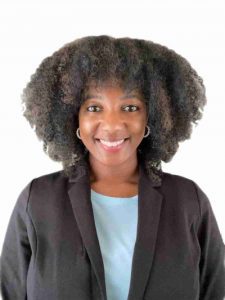
5 Questions with Erin Lawless Miller, Esq., Vice President of Commercial Office & Corporate Counsel, Clinlogix
“5 Questions With…” is a weekly BioBuzz series where we reach out to interesting people in the BioHealth Capital Region to share a little about themselves, their work, and maybe something completely unrelated. This week we welcome 5 Questions with Erin Lawless Miller, Esq., Vice President of Commercial Office & Corporate Counsel, Clinlogix.
Erin Lawless Miller, Esq. is a lawyer and senior executive with more than fifteen years of experience in operations, sales, contracts, and proposal management. She has spent her career driving operational efficiencies, controlling costs, integrating business units, setting up international locations and subsidiaries, and managing legal matters across highly matrixed organizations. Recently, Erin successfully led several acquisitions.
Erin currently serves as Vice President of Commercial Office & Corporate Counsel for Clinlogix, a global clinical trial service provider specializing in cardiovascular devices. Erin is Corporate Counsel and leads the Commercial Office, including sales, marketing, operational analytics, proposals, and contracts. In addition, she continues to leverage government proposals to expand Clinlogix offerings into the government space.
Previously, as VP of Corporate Business Services at Orbis Technologies, Erin helped to start regulatory and clinical business units with a two-pronged approach that included government proposals and strategic partner management. Erin has a history of using change management to turn around struggling startups and non-profits. In 2017, Erin successfully led the acquisition of Cote Orphan by IQVIA, resulting in strategic growth initiatives that doubled EBITDA.
She has served in several capacities: Chief Operating Officer (IQVIA, Inc and Cote Orphan, LLC), Chief of Staff (WTU), Business Development (Venable, LLP), and Principal Consultant (Hyperion Management, LLC). Erin also volunteers as a national committee chair of Women in Bio and is a member of the Maryland Tech Council.
1. Please introduce yourself to our audience with a look back at your education, training, and career.Please introduce yourself to our audience with a look back at your education and training.
Growing up, we had two sets of encyclopedias. Thick, dark books that swelled in the summer humidity, lined the walls behind an old TV. Google wasn’t around yet—so when we needed to prove a point or call on an expert, off we went to the damp pages to evoke our ethos.
We debated everything. I recall one particularly heated dinnertime discourse about whether a gnu is the same thing as a wildebeest (it is…and I won). It was from this world of artful advocacy, and more episodes of Law & Order than I particularly care to admit, that I was drawn towards law school. My grandfather was the Dean of Notre Dame Law School. He always said that his best students were journalists first. This informed my decision to attend and ultimately earn a Bachelor of Science degree from Syracuse University’s S.I. Newhouse School of Public Communications where I studied business, public relations, and psychology.
I sat on the sidelines of my early science classes, hesitant to muck around in anything too dirty- but making good marks and watching intently. One of my first legal jobs was at the boutique FDA firm of Buc & Beardsley, working directly for the infamous senior partner. I discovered my own mental toughness and strong ability to work with difficult people. This has been my ticket to a first-row seat to watch the science that fascinated me while contributing in what I knew best- business, law, and divas.
I went on to earn my Juris Doctor from Syracuse University College of Law, where I focused my studies on the legal applications of communications, science, and technology. Intent to make the most of my legal education, I worked for the University Tech Transfer office and the New York Science and Technology Law Center, where I wrote prolifically about the intersection of science and the law.
I worked in London as a Solicitor in corporate affairs and business. Starting my career at a large law firm for the technology and regulatory practices, my focus was the business side of biotech. To increase my skills over the years, I have engaged in coursework at Harvard Business School and Harvard Law School in Executive Finance, Economics, and Negotiations.
Over the years, I have made my mark on a number of organizations bringing together law and business in the life sciences.
2. For our readers who aren’t familiar with Clinlogix, please introduce the organization, its history, and who you work with.
Years of practice as a registered nurse left our founder and CEO JeanMarie Markham, with an impeding question that continued to follow her in her career: How can we bring patients the therapies they need as quickly and safely as possible, ultimately improving human quality of life?
In 1999, JeanMarie’s pursuit of an answer resulted in the founding of Clinlogix, a Global Clinical Research Organization supporting the regulatory and clinical development pathway of medical devices, biotechnologies, and pharmaceuticals from bench to bedside. Twenty years later, we continue to operate with a patient-centric, client-focused philosophy, helping companies conduct complex, next-generation research and find success in new frontiers of health and medicine.
At Clinlogix (https://www.clinlogix.com/), we are a diverse team of nurses, doctors, biologists, engineers, and academics connected by a passion for medical advancement. Clinlogix is headquartered in Lower Gwynedd, Pennsylvania, and has offices in Japan, Germany, and Colombia to support global product development programs.
3. You’ve worked with organizations that handle a lot of biohealth data. This year’s theme in the BioHealth Capital Region is “Big Bio….Big Data….Converging”. How do you see the role of data in biohealth evolving?
If you like to go fast, you are lucky. We are living in a period that is speeding up the timelines for discovery and approval processes through integrations with data science that produce better results for the individual. The pandemic catapulted rapid and creative advancement that was already underway. Using artificial intelligence, big data analytics, and deep learning—our industry is transforming medical care on a personal level. It’s contributing to a result that is seemingly antithetical to data science- personalized medicine. And it’s happening now, faster.
At IQVIA, I learned firsthand about all the innovative ways to drive technology forward to deliver results for our clients with connected intelligence. Working for a software development company, I further saw how the life science industry is using new analytic tools to understand and shape the utilization of unique data points to predict future outcomes and make better decisions. For example, we all know that information convergence produces better outcomes for individual patients. This translates to significantly improved quality of life when incredible amounts of data is uniquely boiled down to address the nuanced health concerns of the individual.
I see the future evolution as elaborate collaboration between biotech development, healthcare companies, advocacy agencies, and regulators to continue accelerating the sharing of (secured) vital data, driving innovation and approvals faster than ever. As our scientists unlock genomic data, drug development and drug discovery will continue to flourish while maintaining appropriate privacy standards. As a result, the speed at which we discover, test and approve new cures will increase.
It’s easy to get caught up in the excitement of warp speed. Now, it’s on all of us to be mindful that as we race to our critical endpoints and blaze the trail into the future of drug development, that we keep our standards as high as ever and don’t sacrifice the science for pure speed.
4. You’re a national committee chair of Women in Bio and are a member of the Maryland Tech Council, which gives you a unique perspective of our growing region. Where do you see the BioHealth Capital Region going over the next 10 years?
I serve as the National Sponsorship Chair of Women in Bio, where I help all the affiliate chapters across the country meet their financial goals through winning sponsorship from life science organizations. This is essential work because funding women in the sciences is foundational to involving women in the sciences. And we belong here.
I also work with the Capital Region chapter mentoring groups to help women develop stronger networks. Mentors have been found to be vital in developing a successful, meaningful career. But there is a disparity in how mentorship works in practice. Today, in 2021, women are less likely to have a mentor than men. Right here in the Capital Region, women struggle even to find mentors. I want to change that. I help strong women foster deeper connections with other strong women leaders in the area. My goal is to support and enable women to form an “old-girls” alliance they can rely on throughout their careers.
I run three different groups now. First, a seeking and recruiting group that focuses on job searching and best practices for personal branding. Second, a career group that thrives on the array of women from entry-level to senior executives exploring relevant industry topics. Third, an executive group that includes senior-level women to foster an intellectual community of support.
What I’ve learned from my work with Women in Bio is that the Capital Region is in growth mode for women. We have such a talented and impressive array of female entrepreneurs and leaders who continue to amaze me with their insights and accomplishments. As companies continue to combine in our region and continue to develop new and interesting ways to utilize insights from data analytics, I’m optimistic and excited to see how women are positioned at the forefront of development, driving ideas in our region.
5. If you could trade places with any other person for a week, famous or not, living or dead, real or fictional, with whom would it be and why?
This question is really hard for me. Mostly because I know my answer sounds egotistical and absurd at best and not fit for public consumption at worst. But I will tell you my shocking first answer that immediately popped into my head and to which I compared all other answers. I’d be God, obviously (right?).
Think about it, absolute and extreme understanding and knowledge. Omnipotence. Actual omnipotence. Yes, please. At least, at first blush. I assume such grand knowledge would surely come with its deficits. Do I ever really want to know what people honestly think of me? (Probably not!)
As a life-long learner who has always pursued understanding relentlessly. As an avid reader who in my “spare time” is at book number 98 at this writing and decidedly behind pace for the year. As someone who wants to know how things work and why they work that way, unraveling the story behind everything. Yes, please.
Not to mention all the good works I could do and wrongs I could right. The possibilities are endless. In the end, I am addicted to creating possibilities. It’s why my career has focused on the business of biotech It’s why I see change as interesting, necessary, and a collaborative process. And that’s probably why—in this extraordinary hypothetical– I would pick God, against my better judgment (and possibly against my Judgment?).
Thank you to Erin Lawless Miller, Esq., Vice President of Commercial Office & Corporate Counsel, Clinlogix for participating in the 5 Questions with BioBuzz series, and stay tuned for more interviews with others from across the BioHealth Capital Region and beyond.






